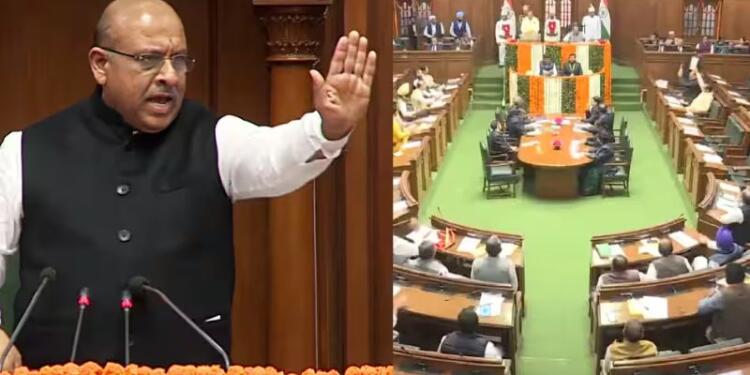Despite huge uproar by the Aam Aadmi Party legislators, Chief Minister Rekha Gupta presented the CAG report in the Delhi assembly. It has made several damning revelations against the earlier Arvind Kejriwal led Delhi regime. But, the biggest expose has been around the liquor policy drafted by the earlier Kejriwal government but was scrapped in an unceremonious manner following mounting criticism and allegations of ‘kickbacks’ and corruption.
#WATCH | Delhi Legislative Assembly Speaker Vijender Gupta says, “It is amazing to know that CAG report has not been tabled in the assembly after 2017-18. In this regard, the then LoP, i.e. me, and five other opposition leaders had requested the President, Speaker of the… pic.twitter.com/gQ93rcyZyk
— ANI (@ANI) February 25, 2025
In its report, CAG has revealed that the exchequer incurred heavy losses worth Rs 2002 crore because of the Excise policy of the previous government. Following the massive expose that incidentally incriminates several of its top leaders, AAP MLAs created a ruckus in the assembly over the presentation of the CAG report. Following the pandemonium, the Delhi Assembly Speaker Vijender Gupta suspended Atishi Marlena and 20 AAP MLAs for the entire day’s proceedings.
While the speech of Lieutenant Governor VK Saxena was going on in the assembly. AAP legislators began loud sloganeering against the Bharatiya Janata Party (BJP) government, disrupting his speech. Speaker Vijender Gupta repeatedly urged them to maintain order, but as the protests intensified, he suspended the MLAs for the day.
#WATCH | Delhi: AAP MLA Gopal Rai also suspended from the legislative assembly by Speaker Vijender Gupta.
Source: Vidhan Sabha pic.twitter.com/qfzBQDLmu9
— ANI (@ANI) February 25, 2025
After being in power for nearly a decade, the Arvind Kejriwal government had implemented a controversial Excise Policy which was quickly rolled back following allegations of corruption. Senior AAP leaders including former CM Arvind Kejriwal, former Deputy CM Manish Sisodia sent time behind bars, and are currently out on bail, over the allegations of irregularities in this now-defunct liquor policy.
CAG report on Kejriwal’s ₹2,026 Cr Liquor Scam! pic.twitter.com/CMqy6swuuw
— Rishi Bagree (@rishibagree) February 25, 2025
Now the CAG report has exposed incriminating details regarding this scam-tainted liquor policy. Presented in the Delhi Assembly by the newly elected Chief Minister of Delhi Rekha Gupta, the CAG report details alleged irregularities that took place between 2017-18 to 2020-21.
It states that serious irregularities have been found in the liquor policy of the Kejriwal government. Due to the liquor policy, the government incurred losses worth Rs 2002 crore. Additionally, the Delhi government could not get the tendering done for the surrendered licenses, resulting in Rs 890 crore losses to the Delhi government. The zonal license holders were given exemption because of the delay in action which inturn caused a loss of Rs 941 crore. The CAG report has also revealed that the liquor sellers were given a rebate of Rs 144 crore as license fee during the lockdown phase when COVID-19 was at its peak. For not collecting the security deposit properly, the Delhi government suffered a loss of Rs 27 crore.
The report has further revealed that the government also incurred losses for violation of the rules of liquor license. Rule 35 under the Delhi Excise Rules, 2010 was not implemented properly, causing loss to the government as well as bringing irregularities in the liquor trade. In fact, the rule prohibits the issuance of more than one license.
It also revealed that some retailers kept the license till the expiry of the policy, while some surrendered the license soon in the wake of the formation of the Excise policy. Since there was no provision to give advance notice before surrendering the license, the supply of liquor was also affected.
Apart from this, businessmen interested in manufacturing and retail were given wholesaler licenses, which benefited only a few specific businessmen in the entire supply chain of liquor. Resultantly, the margin of wholesalers increased from 5% to 12%.
The CAG report also revealed that in many cases the testing reports did not meet the standards set by the Bureau of Indian Standards (BIS). Despite this, the Excise Department showed negligence in issuing licenses. Many brands did not submit reports related to water purity, harmful substances, heavy metals, methyl alcohol and microbiological testing. Furthermore, 51% of the test reports related to foreign liquor were either more than a year old, or were not available, or did not mention the date.
From pages 47 to 55, this 166-page report explains in detail how the sale of liquor was approved in Delhi by ignoring quality checks and certificates. The CAG report also states that while issuing licenses, the department failed to ensure whether the liquor test reports were in accordance with the standards of BIS or not.

























